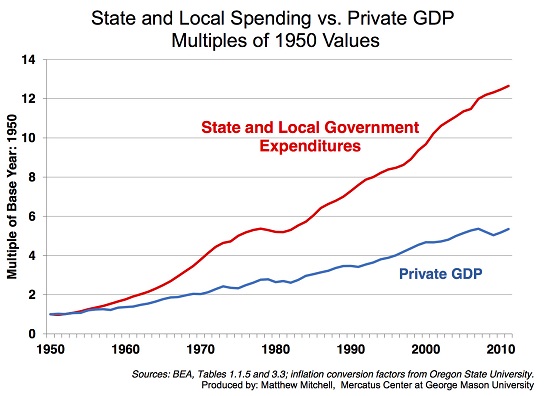Summary:
People love their big paychecks, but they also value their sanity.
One of the most astonishing manifestations of disconnected-from-reality hubris is public authorities’ sublime confidence that employers and entrepreneurs will continue starting and operating enterprises no matter how difficult and costly it becomes to keep the doors open, much less net a profit.
The average employee / state dependent reckons that the small business owner / entrepreneur is killing it financially, banking a small fortune in pure profit every month, and that they’re doing what they love so they’ll continue doing it no matter what. In other words, they’re all wealthy Tax Donkeys who can easily afford higher taxes and fees and will
Topics:
Charles Hugh Smith considers the following as important:
5) Global Macro,
Featured,
newsletter,
The United States
This could be interesting, too:
Nachrichten Ticker - www.finanzen.ch writes Die Performance der Kryptowährungen in KW 9: Das hat sich bei Bitcoin, Ether & Co. getan
Nachrichten Ticker - www.finanzen.ch writes Wer verbirgt sich hinter der Ethereum-Technologie?
Martin Hartmann writes Eine Analyse nach den Lehren von Milton Friedman
Marc Chandler writes March 2025 Monthly
People love their big paychecks, but they also value their sanity.
One of the most astonishing manifestations of disconnected-from-reality hubris is public authorities’ sublime confidence that employers and entrepreneurs will continue starting and operating enterprises no matter how difficult and costly it becomes to keep the doors open, much less net a profit.
The average employee / state dependent reckons that the small business owner / entrepreneur is killing it financially, banking a small fortune in pure profit every month, and that they’re doing what they love so they’ll continue doing it no matter what. In other words, they’re all wealthy Tax Donkeys who can easily afford higher taxes and fees and will tolerate paying more to keep doing what they love.
Wrong on both counts–dead wrong. A far more typical response is the one a house painter emailed me last year: every day, he reported, he wanted to dump his spray rig and power washer in a dumpster and leave the U.S.
The number of small businesses and entrepreneurs hanging on by a thread financially and emotionally is legion. Rather than killing it, they’re getting killed by rising rents, wages, labor overhead, taxes, fees, licensing, inspection fees, insurance and so on.
The long hours, financial risks and open-ended responsibilities are ideal conditions for burn-out and bankruptcy.
My partner and I had a ready response when employees hinted that we must be raking in big bucks: here’s the keys to the front door, payday is on Friday.That shut them up in short order because they could see we meant it: it’s all yours, including meeting payroll in a bad month out of your own pocket.
The craze for early retirement among highly paid workers is a manifestation of burnout: young workers see the destructive toll of stress and overwork on their older peers and vow to scrimp and save to avoid that fate. Young workers who burn out end up back at home or in low-key, low-pay jobs that don’t demand their life and their soul in trade for a big salary.
Older workers in senior positions are retiring the second they qualify–or earlier. Their professions are simply no longer fun or rewarding.
The general public and government officials are clueless about the ever-increasing burdens being heaped on small-business employers and entrepreneurs. It’s not just financial burdens–it’s the stress of being fined for minor violations of complex regulations few small business owners can track, and the constantly increasing regulatory compliance paperwork.
Again, the general assumption is the employer and entrepreneur have no choice but to continue soldiering on, even as the burdens of operating a business are crushing. This assumption aligns with the convenient belief that small business Tax Donkeys can pay more and should pay more, and they should be delighted to earn the privilege of operating in our progressive city/county/state.
| The number of small businesses that will shut down in the coming recession will astound governments counting on higher revenues from the Tax Donkeys.The number of highly productive and highly paid workers who quit or retire early will be equally astounding to Corporate America, which blissfully assumes the Productive Class will take every increase in workload and responsibility that’s shoved on them because they love the big paychecks so much.
People love their big paychecks, but they also value their sanity; and after years or decades of corporate servitude, an unexpectedly large number will regain their long-lost agency, which they will express by quitting and bailing on their high-cost lifestyle.
When the Productive Class has been pushed hard enough, they will opt out, and the corporations and governments that have counted on their servitude will find that all of their systems no longer function well, if at all, once their most productive peons toss their servitude in the nearest dumpster and opt for a much lower cost and lower-key life. |
State and Local Spending vs Private GDP, 1950-2010 - Click to enlarge |
My new book is The Adventures of the Consulting Philosopher: The Disappearance of Drake. For more, please visit the
book's website.
Tags:
Featured,
newsletter


